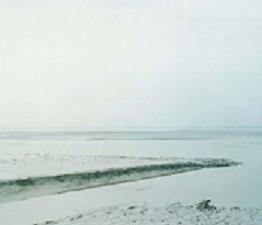Elger Esser
22 Jul - 31 Aug 2006
ELGER ESSER
"Neue Werke"
We are pleased to introduce a completely new work cycle by the German photographer Elger Esser, at the Kunstraum Deutsche Bank in Salzburg.
The classical picture genres vedute and landscape are core topics in Elger Esser's photographic oeuvre. Over the past years, formal links to these genres have been established by largely monochrome colouring, a preference for diffuse, even light arrangements, and a continuous tension between micro and macro structures. The perfect synthesis of a timeless, old-masterly ideal of beauty and the technical exploration of the medium photography in Elger Esser's own style is still a singular phenomenon in contemporary art.
With observational sensitivity and precision, Elger Esser seeks out those moments in his surroundings that uncover the essential character and atmosphere of a landscape. Elger Esser often finds the true personality of a landscape in connection with the architecture of the region. For the artist, water, light, and architecture are insolubly related.
It is not by chance that Elger Essers photographs often trigger associations with the travel literature of the late eighteenth and nineteenth century. His intensive investigation of literary landscape descriptions is manifested in his works. And there are just as many art-historical references. Especially recourses to the art form of postcards in the nineteenth century and to Dutch painting of the seventeenth century deserve being mentioned.
Elger Esser's works reflect an eye that has been trained in literature and art history and intuitively finds its pictures.
In his new cycle, he mainly deals with the dissolution of photography into impressions of painting. On the one hand, Esser picks up the threads of earlier, Minimalist works. On the other, his landscapes are given a new sense of motion, creating an entirely new atmosphere by the softness of the contours.
On the basis of his utterly own pictorial world, Esser reflects the French art of the nineteenth century. Associations with the art movements Impressionism and Pointillism suggest themselves. Esser describes the relationship between photography and painting as "very close. [...] Today, photography also meets demands that, in the past, have been met by painting. By all means, I see a reminiscence of that in my works."
The objectivating, detachedly documenting eye of his professor at the Düsseldorfer Kunstakademie, Bernd Becher, cannot be found in Elger Esser's photographs which might be called a poetic documentation of subjective memories. However, the formal strictness of the pictorial composition that runs through his works as a leitmotif is comparable.
"Neue Werke"
We are pleased to introduce a completely new work cycle by the German photographer Elger Esser, at the Kunstraum Deutsche Bank in Salzburg.
The classical picture genres vedute and landscape are core topics in Elger Esser's photographic oeuvre. Over the past years, formal links to these genres have been established by largely monochrome colouring, a preference for diffuse, even light arrangements, and a continuous tension between micro and macro structures. The perfect synthesis of a timeless, old-masterly ideal of beauty and the technical exploration of the medium photography in Elger Esser's own style is still a singular phenomenon in contemporary art.
With observational sensitivity and precision, Elger Esser seeks out those moments in his surroundings that uncover the essential character and atmosphere of a landscape. Elger Esser often finds the true personality of a landscape in connection with the architecture of the region. For the artist, water, light, and architecture are insolubly related.
It is not by chance that Elger Essers photographs often trigger associations with the travel literature of the late eighteenth and nineteenth century. His intensive investigation of literary landscape descriptions is manifested in his works. And there are just as many art-historical references. Especially recourses to the art form of postcards in the nineteenth century and to Dutch painting of the seventeenth century deserve being mentioned.
Elger Esser's works reflect an eye that has been trained in literature and art history and intuitively finds its pictures.
In his new cycle, he mainly deals with the dissolution of photography into impressions of painting. On the one hand, Esser picks up the threads of earlier, Minimalist works. On the other, his landscapes are given a new sense of motion, creating an entirely new atmosphere by the softness of the contours.
On the basis of his utterly own pictorial world, Esser reflects the French art of the nineteenth century. Associations with the art movements Impressionism and Pointillism suggest themselves. Esser describes the relationship between photography and painting as "very close. [...] Today, photography also meets demands that, in the past, have been met by painting. By all means, I see a reminiscence of that in my works."
The objectivating, detachedly documenting eye of his professor at the Düsseldorfer Kunstakademie, Bernd Becher, cannot be found in Elger Esser's photographs which might be called a poetic documentation of subjective memories. However, the formal strictness of the pictorial composition that runs through his works as a leitmotif is comparable.

